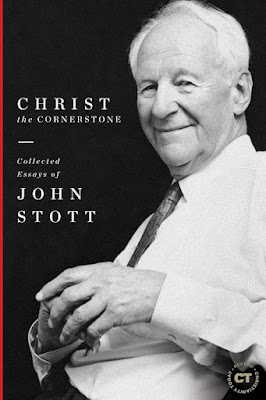reading Stott
"If we Christians dare to say that we are going to heaven when we die, and that we are sure of final salvation, as we do dare to say, it is not because we are self-righteous or self-confident; it is because we believe in the steadfast love of God, the love that will not let us go." (John Stott, Men Made New)
============
John R. W. Stott (1929--2011) was an Anglican clergyman, author, and speaker who had a global impact on evangelical Christianity in the second half of last century. His contemporaries included Martyn Lloyd-Jones, J. I. Packer, Francis Schaeffer, and Billy Graham.
Though I never heard Stott preach, I did read many of his books through the years, which were formative in my Christian thinking. Here's a sampling, with publication dates: Men Made New (1966), Basic Christianity (1971), Your Mind Matters (1972), Baptism & Fullness (1975), Christian Counterculture (1978), Between Two Worlds (1982), The Cross of Christ (1986), and Why I Am a Christian (2003). These are all still very relevant, excellent reading! Plus, Stott produced a number of popular commentaries on books of the Bible.
Here are a couple of excerpts:
“Many people visualize a God who sits comfortably on a distant throne, remote, aloof, uninterested, and indifferent to the needs of mortals, until, it may be, they can badger him into taking action on their behalf. Such a view is wholly false. The Bible reveals a God who, long before it even occurs to man to turn to him, while man is still lost in darkness and sunk in sin, takes the initiative, rises from his throne, lays aside his glory, and stoops to seek until he finds him.” (From Basic Christianity)
“The astonishing paradox of Christ's teaching and of Christian experience is this: if we lose ourselves in following Christ, we actually find ourselves. True self-denial is self-discovery. To live for ourselves is insanity and suicide; to live for God and for man is wisdom and life indeed. We do not begin to find ourselves until we have become willing to lose ourselves in the service of Christ and of our fellows." (From Basic Christianity)
Currently I'm reading his collected essays from Christianity Today, entitled Christ the Cornerstone (Lexham Press, 2019), as well as going through the two-volume biography of Stott by Timothy Dudley-Smith, published in 1999 and 2001.
Here's a sample from Christ the Cornerstone:
"Preaching the gospel, far from being unnecessary, is indispensable. It is the God-appointed means by which the prince of darkness is defeated and the light comes streaming into people's hearts. There is power in God's gospel -- his power for salvation (Rom. 1:16).
"In our day there is a widespread disenchantment with words. People are bombarded with words by advertisers, politicians, and propagandists, until they become 'word-resistant.' In countries where television is available, words lose their power because of the greater power of images. After all, what is a word? Only a puff of breath, and in a moment it is gone, so intangible and transient is it.
"But the Bible has a different perspective. Behind every word is the person who speaks it, and the authority he possesses or lacks. God's Word has power for the sole reason that it is God who speaks it. His Word is creative ('for he spoke and it was done,' Ps. 33:9), productive ('my word ... shall not return to me empty but it shall accomplish that which I purpose,' Isa. 55:11), and redemptive ('it pleased God through the folly of what we preach to save those who believe,' 1 Cor. 1:21). Still today God honors his Word. Whether we share it with a single individual or preach it to a congregation or broadcast it by radio or distribute it in print, through it he can put forth his saving power."
John Stott is an author you should know, and I hope you have read, or will read, some of his books. His work on the death of Jesus, The Cross of Christ (IVP, 1986) is a classic, and a good place to begin!
--Sandy




Comments
Post a Comment